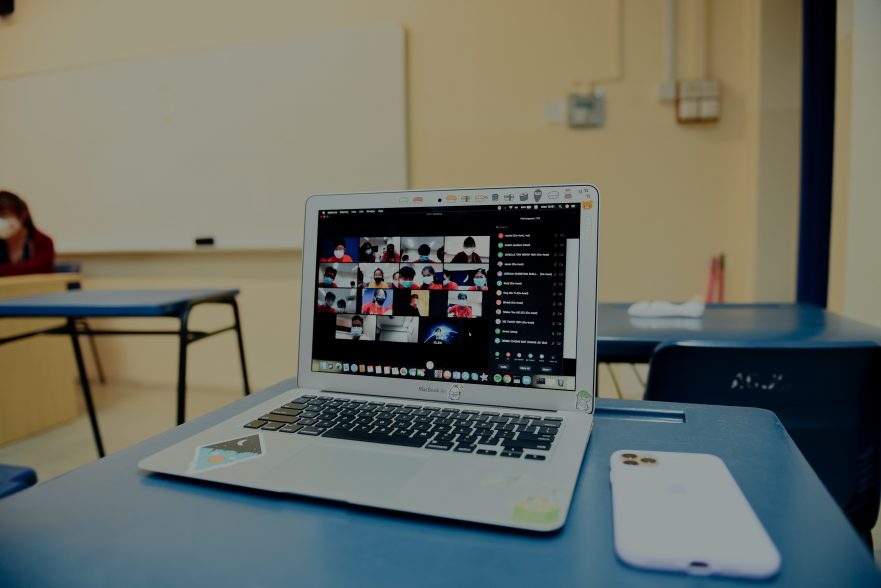COVID-19 and the Rise of Online Learning: Does Technology Ensure High-Quality Education?
![]()

One of the main consequences of the COVID-19 outbreak for education has been the rise of online learning. The relevance of this phenomenon, which was already emerging in the pre-COVID-19 times, has considerably increased in the wake of the lockdowns that the UK Government has been enforcing in order to contain the spread of the virus. As a result of the temporary closure of schools, many students are accessing education exclusively via digital platforms.
Not only has online schooling revealed inconvenient truths about our society, but it also poses significant challenges for the future of education. It may be helpful, in the first instance, to examine how COVID-19 has uncovered social inequalities. As many studies report, the digital divide between children from wealthy families and those from disadvantaged backgrounds is conspicuous. Numerous low-income families have a single device for accessing the Internet at their disposal, or cannot rely on a fast and reliable connection. The lack of adequate technology makes remote learning complicated if not impossible for underprivileged pupils. In the absence of decisive support for disadvantaged families on the part of the Government, the digital divide has resulted in a widening of the learning gap. Better-off students may benefit from possibilities, ranging from private tutoring to individual conversations with teachers, unobtainable for most pupils, thus enjoying a higher standard of education.
Despite the issues outlined above, online learning, at least in the short-term future, will be at the heart of education. The question arises whether this form of learning is more or less effective when compared to more traditional methods. The first pieces of research carried out on this theme seem to suggest that, on average, online schooling does not ensure the same results as face-to-face teaching. Over the summer of 2020, the National Foundation for Educational Research conducted a survey targeting almost 3,000 headteachers and teachers in approximately 2,200 primary and secondary schools across England. The large majority of teachers said that their students were significantly behind where they would expect them to be in the curriculum by that point of the year. Overall, it is estimated that pupils in England were three months behind. Unsurprisingly, children from poor families paid the highest price.
Is lack of adequate technology to support homeschooling the only reason accounting for this situation? No certain and straightforward answer can be provided, as experts disagree on the role of digital technology in itself in relation to learning.
Neuroscientist Jared Cooney Horvath, for instance, argues that computers do not constitute the best tool to enhance learning. He has recently collected fifty studies making the case, from different perspectives, that technological devices impair learning. For example, he has reviewed papers demonstrating that the use of laptops in class negatively correlate with students’ performance; that students who take notes using a tablet perform worse than those using pen and paper; or that students in computerised maths programmes achieve worse outcomes than those participating in a similar face-to-face class. Elaborating on the findings of these studies, Cooney Horvath maintains that the key reason behind the poor performance of tech-based education is that students do not see learning as the primary function of computers. Rather, they regard them as instruments for consuming media content, whether in the form of videos, music or written text, communicating with their peers and playing. Research conducted in the United States has shown that students using computers for homework take, on overage, less than six minutes before falling under the allure of social media.
Other studies, by contrast, contend that, whereby appropriate technology is available, online learning may be beneficial in several respects. It enables students to retain more information and to learn faster than in a conventional classroom setting. By collecting and analysing a vast amount of data, online learning platforms can identify strengths and weaknesses of each student, and therefore provide highly personalised, and more enjoyable, learning programmes.
The effectiveness of online learning, therefore, remains an open question, a question of which the importance is destined to grow in the near future. At present, it is worth highlighting some key considerations. The COVID-19 crisis, as discussed above, has unveiled the digital divide between disadvantaged and wealthy children. By availing themselves of superior technological equipment, the latter are in the position to access a better learning, which leads to a broadening of the educational gap with underprivileged pupils. The initiatives of the Government to remedy this situation, such as the Get Help with Technology programme, are praiseworthy and go in the right direction, although, some commentators point out, such initiatives are taking place at a pace slower than necessary to ensure tangible results. Further efforts are still needed.
The availability of adequate technology, albeit essential, is not necessarily synonymous with high-quality education.
Second, the availability of adequate technology, albeit essential, is not necessarily synonymous with high-quality education. A number of factors determine the influence of digital technologies on students’ learning. The word that best defines the sum of these factors is engagement. In order to get the most out of tech-based education, students need to learn how to relate to and engage with a disruptive novelty such as the fully online classroom environment and how to minimise distractions that computers and tablets frequently bring. In other words, a shift in attitudes towards the use of technology for educational purposes is desirable. It would be unfair to expect students to undertake this process by themselves. They should be accompanied in this journey by teachers, who, in turn, need to receive proper training enabling them to face the multiple challenges that the COVID-19 pandemic has posed in the education sector with confidence and flexibility.
On a parting note, it should be remarked that, regardless of the measures that the Government, schools and teachers are willing to put in place, a fully remote and tech-based form of education will likely not be equally suitable for all students. Pupils with SEND, for example, or those who have disengaged from mainstream education, might find more difficult to adapt to the online classroom. Nor can this educational model be appropriate for all subjects, physical education, cookery and science lab courses being just the most glaring examples. We must, however, bear in mind that, under the current circumstances, online learning is a necessity rather than a choice. All institutions and professionals operating in the field of education should thus join forces to deliver the best possible online learning experience, irrespectively of its superior or, more likely, inferior effectiveness compared to face-to-face teaching.



